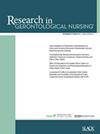老年人认知功能感知、糖尿病自我管理和血糖变异性之间的关系:一项混合方法研究。
IF 1.1
4区 医学
Q3 NURSING
引用次数: 4
摘要
本研究旨在探讨老年2型糖尿病(T2DM)患者感知认知功能、血糖变异性和自我管理之间的关系。采用混合方法设计,数据来自:(A)感知认知功能和糖尿病自我管理问卷;(b)连续血糖监测(CGM)报告;(c)半结构化访谈。30名成人T2DM患者(女性占47%;平均年龄= 68.5 [SD = 5.2]岁)。那些每周锻炼天数更多的人血糖更稳定。那些报告坚持饮食天数较少的人有更多的低血糖。报告记忆不满意程度较高的参与者表现出更高水平的葡萄糖变异性。研究结果指出,血糖变异性可能是降低糖尿病对认知功能影响的靶点。通过CGM识别血糖模式的指导可以整合到自我管理教育中,以改善自我管理和随后的血糖控制和认知功能。[老年护理研究,xx(x), xx-xx.]本文章由计算机程序翻译,如有差异,请以英文原文为准。
Relationships Among Perception of Cognitive Function, Diabetes Self-Management, and Glucose Variability in Older Adults: A Mixed Methods Study.
The aim of the current study was to explore relationships among perceived cognitive function, glucose variability, and self-management in older adults with type 2 diabetes mellitus (T2DM). A mixed methods design was used with data from: (a) questionnaires on perceived cognitive function and diabetes self-management; (b) continuous glucose monitoring (CGM) reports; and (c) semi-structured interviews. Thirty adults with T2DM (47% female; mean age = 68.5 [SD = 5.2] years) participated. Those who exercised more days per week had more stable glucose. Those who reported fewer days of diet adherence had more hypoglycemia. Participants who reported higher levels of memory dissatisfaction exhibited higher levels of glucose variability. Findings point to the potential of glucose variability as a target to reduce the effect of diabetes on cognitive function. Instruction in recognition of glucose patterns found via CGM can be integrated into self-management education to improve self-management and subsequent glucose control and cognitive function. [Research in Gerontological Nursing, xx(x), xx-xx.].
求助全文
通过发布文献求助,成功后即可免费获取论文全文。
去求助
来源期刊

Research in Gerontological Nursing
NURSING-
CiteScore
2.30
自引率
6.20%
发文量
44
审稿时长
>12 weeks
期刊介绍:
Research in Gerontological Nursing is a forum for disseminating peer-reviewed, interdisciplinary, cutting-edge gerontological nursing research and theory to investigators, educators, academicians, clinicians, and policymakers involved with older adults in all health care settings. The Journal accepts manuscripts reporting research, theory, integrative and systematic reviews, instrument development, and research methods with the aims of improving the wellness and quality of care of the older adult population. Theory papers should advance gerontological knowledge, and integrative reviews should provide an analysis of the state of the science and provide direction for future research.
 求助内容:
求助内容: 应助结果提醒方式:
应助结果提醒方式:


